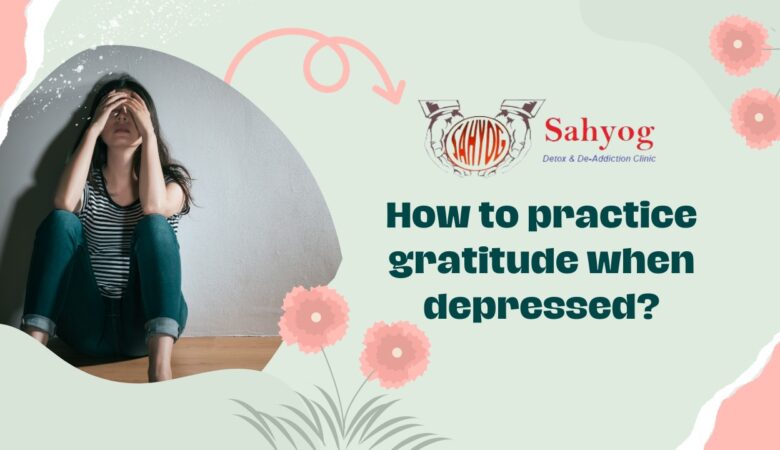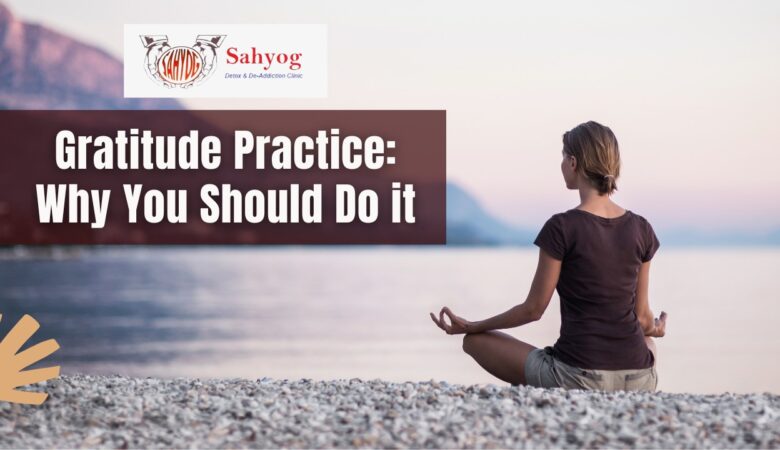How to practice gratitude when you feel depressed? (7 ways)
Recognizing and appreciating the positive aspects of our lives is central to the gratitude exercise. While practicing gratitude at times of sadness may seem impossible, it has been found to alleviate symptoms and improve well-being. The inability to see the bright side of things while depressed can lead to a vicious cycle that is difficult to break. However, practicing gratitude may help you shift your perspective and draw attention to the positives in your life. Here are seven simple ways to practice gratitude even when you’re feeling bad, such as maintaining a gratitude journal or helping others through volunteer work or charitable donations. 1. Acknowledge Your Feelings: Recognizing that you are feeling sad is the first step toward exercising gratitude. Feeling hopeless, overwhelmed, or down might make it hard to notice the bright sides of life when you’re depressed. However, it’s crucial to pay attention to and respect your own emotions. If you try to suppress your feelings or seem like everything is fine, the situation may escalate. Instead, be patient with yourself and give yourself enough time to express your emotions effectively. You can write it down, talk to a reliable person, or even consult an expert. Don’t put yourself down, and prioritize your health. Always remember that it takes fortitude to seek help when you need it and that it is okay to feel sad or anxious sometimes. Feelings may be better understood and gratitude can be practiced simply by giving them names. 2. Starting your gratitude diary: When you’re feeling depressed, one of the finest ways to exercise appreciation is to keep a Thanksgiving diary. A thankfulness journal might be an app or a notebook where you write down the things you’re thankful for every day. Taking a breather to reflect on the positive aspects of your life might help you shift your outlook and foster a more optimistic frame of mind. To begin a gratitude journal, commit some time every day to reflecting on the many blessings in your life. They might be as simple as a friend’s kind gesture, a beautiful sunset, or a hot cup of tea. Write down three things you’re thankful for every day and reflect on them. If you try to think about the positive aspects of your life, you may start to feel better. A thankfulness journal can serve as a reminder of the good things in your life when you’re feeling down. You may always look back on your entries and be reminded of the good things in your life, even on the bad days. Developing an attitude of gratitude can boost your happiness and well-being. 3. Make a list of all your many favors: When you’re feeling down, it might be hard to see the bright side of things. Focusing on the positives in your life, however small, can help you develop an attitude of gratitude. Little blessings are the basic pleasures of life that we often overlook, such as a comforting embrace, a favorite song, or a delicious meal. Recognizing these small blessings may help you feel more optimistic and joyful. If you want to appreciate the simple things in life, try to be present and pay attention to your senses. Notice all you can: what you can see, hear, smell, taste, and feel. Take some time to savor a meal, admire the scenery, or unwind with a bath and a cozy blanket. Paying attention to these seemingly little presents may help you feel more grounded and connected to the world. Keep in mind that being thankful means focusing on the good things in your life rather than dwelling on the bad. Taking stock of the good things in your life, no matter how small, may help you see the good even when circumstances are tough. 4. Improve how you think through: Mindfulness entails focusing on the here and now and conducting a dispassionate evaluation of one’s emotional and mental states. It might be an effective method of cultivating gratitude while you’re feeling low. Mindfulness training raises self-awareness, which in turn fosters objectivity about one’s inner experiences. To cultivate mindfulness, choose a quiet, comfortable place to sit or lie down. Close your eyes and concentrate on your breathing. Feel the air going into and out of your body. At any time when your attention wanders away from your breathing, return it to it. As you get more practiced in mindfulness, you may find yourself extending its use to other areas of your life. Mindful eating may be achieved by savoring each bite and paying attention to the various tastes and textures on your tongue. Mindful walking entails paying attention to your environment and the feeling of your feet on the ground. Mindfulness training can aid in developing gratitude by training one to remain in the present moment and appreciate its small pleasures. Mindfulness may help you manage depressive symptoms including negative thinking and feelings of being overwhelmed. 5. Express gratitude towards others: One way to cultivate gratitude while depressed is to express it to others. One of the most important aspects of being grateful is being aware of the good things that have happened to you and others around you. Relationships and community spirit might benefit from making others feel valued. Think about who has helped you the most and show your appreciation to them. Someone who showed you kindness may have been a close friend, a family member, a coworker, or even a total stranger. Show your appreciation with a text message or a handwritten letter. One way to express gratitude is to personally thank someone and explain why you’re grateful to them. If you’re having trouble shifting your focus from yourself and your problems to the positive contributions other people have made to your life, practicing gratitude may help. It may also help you feel more connected to others, which may boost your mood and a general feeling of well-being. 6. Doing nice deeds such as volunteering or donating Last but not least, if


